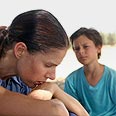

Sweet Mud, a new Israeli film by Dror Shaul, portrays kibbutz life in the 70's and places a big question mark on the socialist idealism of the kibbutz movement, breaking many taboos that have already been debated at length by Israeli society.
Kibbutz life, as portrayed in Shaul's film, is recreated so vividly that sounds of agreement could be heard in the audience at the sight of the uncannily authentic scenes. The sepia colored images of old familiar settings and furnishings, down to the finest detail, create a nostalgic picture whether it's the nursery with bottles of milk ready to sooth crying babies in the middle of the night, or the now rare kerosene heaters every household had at the time.
Sweet Mud, tells the story of Dvir, a captivating 12-year-old boy (played by talented 14-year old Tomer Steinhof) growing up on a kibbutz. The story spans four seasons from the summer of 74 to the spring of 75.
It is the year of Dvir's Bar Mitzvah and he and his classmates are forced to undergo a series of "initiation" tests before reaching manhood to prove their allegiance to the kibbutz movement.
The autobiographical storyline draws on the writer/director Dror Shaul's memories of growing up on a kibbutz alongside his mentally unstable and widowed mother. In the movie, Dvir's enchanting mother Miri, who teeters on the edge of insanity, is impressively portrayed by first time actress Ronit Yudkevitch.
Questions of insanity
The question of Miri's sanity raises many questions as to the justness of the kibbutz system. Her so called insanity can be viewed in two ways: By not fitting into the rigid mold of kibbutz rules and regulations she could be viewed as mentally unstable, but on the other hand she could also be viewed as the only sane member on the kibbutz who has the courage to speak out against its suffocating and debilitating way of life that ultimately drives her to the brink of madness.
Her role as a dysfunctional mother also highlights the dysfunctional system of early kibbutz life, and its inability to act as a "collective parent" or to deal with social "misfits."
Sweet Mud shines a bright light on the harsh rules of 'kibbutz equality' and its uncompromising interference in every aspect of human life. Anything irregular is put to a collective vote. An iron fist reprimands prankish children who sneak into the communal kitchen to steal an ice Popsicle, and all luxuries and private funds are confiscated "for the benefit of the whole" including a personal wrist watch.
Following a weekly kibbutz meeting, where decisions pertaining to the collective group are made, Miri is given permission for her Swiss lover, Stephan (Henri Garcin) to visit her on the kibbutz for three weeks, even though she has asked for four.
Here we see how the most intimate details of a Miri's life becomes common knowledge, giving other members a platform to whisper and stare and glance disapprovingly at her "irregular conduct." Miri's love letters are translated from French to Hebrew by another kibbutz member who reads them out loud to her husband, who gives his own comments in the replies. Jealousy and finally avarice lead to the lover's dismissal from the kibbutz.
From here Miri's s downward flight into a catatonic state of depression is accelerated while she is assisted only by Dvir, her doting and highly mature son who tries to deal with his dysfunctional mother.
Dvir is undoubtedly the star of this film and the entire storyline unfolds through his painful adolescence. Although he must sleep in the children's dormitories away from his mother, a custom upheld until recently, he lays awake at night devising original and often comic ways of getting his mother's life back on track.
True to life portrayal
The film presents a true-to- life yet very harsh image of a unique form of communal life that still exists today, albeit numerous changes. This in itself is testimony that something in the system did indeed work. Viewers who personally experienced kibbutz life in its early stages will enjoy the faithful rendition, being able to sort the chaff from the wheat, excuse the pun.
Those getting a glimpse of kibbutz life for the first time may be in for a shock, as Sweet Earth tends to highlight only negative aspects while ignoring the many positive ones that have kept the kibbutz movement alive to this day.
The film Sweet Mud was filmed on the kibbutzim of Ruhama and Nir Eliyahu and was a co-best film winner at Israel’s Ophir Awards.















